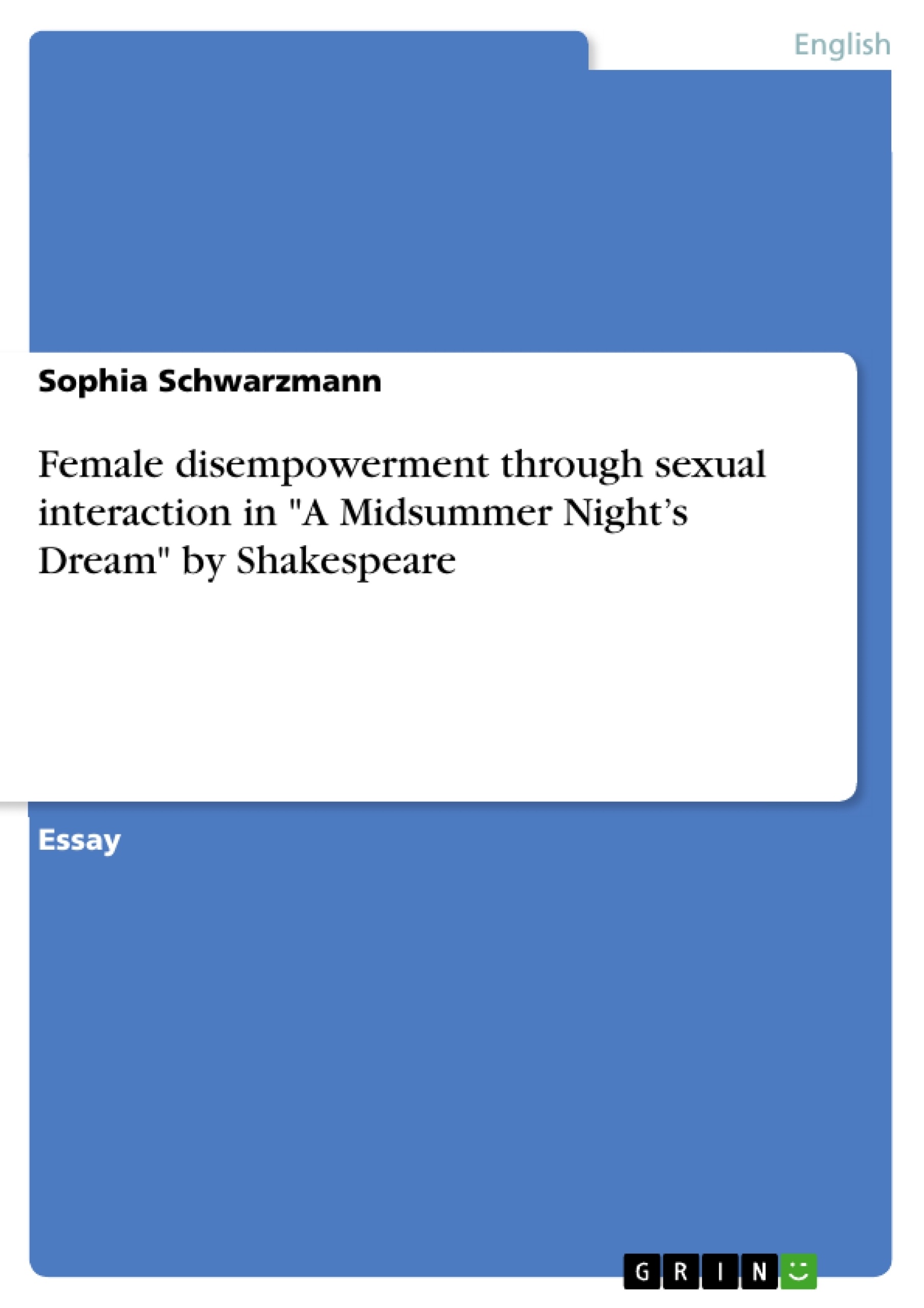The essay deals with the oppression or emancipation of women in Shakespeare's "A Midsummer Night's Dream”.
The essay will have a look at three scenes within which sexual intercourse is implied. In them the threat of male dominance to females within sexual relationships both physically and socially, how marriage can be a metaphor for imbalanced power distribution, and the possibility of engaging in a heteroerotic relationship without experiencing disempowerment as a woman will be explored thoroughly.
Table of Contents
- Introduction
- Main Body
- The role of gender within the concept of sexual agency
- Conclusion
- Hunter and Prey: The danger of a misogynistic society structure through role reversal: Hermia and Lysander (Act 2, Scene 2)
- Rulership: Male dominance in leader positions through the relationship of Hippolyta and Theseus
- Challenging of Subordination Feminism and traditional gender roles: Helen’s pursuit of Demetrius (Act 2, Scene 1)
Objectives and Key Themes
This essay examines the role of sexual intercourse in perpetuating female subordination within a male-dominated society. It argues that while sexual intercourse can contribute to this problem, it is not the primary cause. The essay analyzes three scenes from Shakespeare’s A Midsummer Night’s Dream to explore the threats posed to women by male dominance in sexual relationships, the implications of marriage as a metaphor for imbalanced power dynamics, and the possibility of women engaging in heteroerotic relationships without experiencing disempowerment.
- The intersection of gender and sexual agency
- The impact of male dominance on female empowerment in sexual relationships
- The role of marriage as a symbol of power imbalance
- The potential for women to challenge traditional gender roles in heteroerotic relationships
- The dangers of victim-blaming and its impact on the perception of sexual violence
Chapter Summaries
- Introduction: The essay introduces the concept of gendered power dynamics and the potential role of sexual intercourse in perpetuating female subordination. It provides a brief overview of the essay’s objectives and methods.
- The role of gender within the concept of sexual agency: This section delves into the historical context of gender roles and the influence of social structures on sexual relationships, highlighting the enduring impact of traditional gender roles on contemporary society.
- Hunter and Prey: The danger of a misogynistic society structure through role reversal: Hermia and Lysander (Act 2, Scene 2): This chapter analyzes the scene between Hermia and Lysander in A Midsummer Night’s Dream, examining how role reversal reveals the inherent threats posed to women by a male-dominated society in sexual interactions.
- Rulership: Male dominance in leader positions through the relationship of Hippolyta and Theseus: This section explores the relationship between Theseus and Hippolyta, using their marriage as a metaphor for the imbalanced power dynamics within male-female relationships. It highlights how societal expectations and traditional gender roles limit women’s opportunities for agency and self-determination.
- Challenging of Subordination Feminism and traditional gender roles: Helen’s pursuit of Demetrius (Act 2, Scene 1): This chapter focuses on the scene involving Helen and Demetrius, analyzing Helen’s proactive pursuit of Demetrius as a challenge to traditional gender roles. It examines how her actions highlight the potential for women to break free from societal expectations and assert their own agency in relationships.
Keywords
This essay explores the intersection of gender and sexual agency, focusing on the concept of female subordination within a patriarchal society. It examines the themes of male dominance, power imbalance, victim-blaming, traditional gender roles, and the potential for women to challenge these structures through their relationships. The essay utilizes key concepts from feminist theory and analyzes specific scenes from William Shakespeare’s A Midsummer Night’s Dream to support its arguments.
- Citar trabajo
- Sophia Schwarzmann (Autor), 2021, Female disempowerment through sexual interaction in "A Midsummer Night’s Dream" by Shakespeare, Múnich, GRIN Verlag, https://www.grin.com/document/1236986




